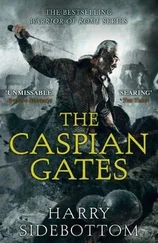Harry Sidebottom - The Wolves of the North
Здесь есть возможность читать онлайн «Harry Sidebottom - The Wolves of the North» весь текст электронной книги совершенно бесплатно (целиком полную версию без сокращений). В некоторых случаях можно слушать аудио, скачать через торрент в формате fb2 и присутствует краткое содержание. Жанр: Исторические приключения, на английском языке. Описание произведения, (предисловие) а так же отзывы посетителей доступны на портале библиотеки ЛибКат.
- Название:The Wolves of the North
- Автор:
- Жанр:
- Год:неизвестен
- ISBN:нет данных
- Рейтинг книги:3 / 5. Голосов: 1
-
Избранное:Добавить в избранное
- Отзывы:
-
Ваша оценка:
- 60
- 1
- 2
- 3
- 4
- 5
The Wolves of the North: краткое содержание, описание и аннотация
Предлагаем к чтению аннотацию, описание, краткое содержание или предисловие (зависит от того, что написал сам автор книги «The Wolves of the North»). Если вы не нашли необходимую информацию о книге — напишите в комментариях, мы постараемся отыскать её.
The Wolves of the North — читать онлайн бесплатно полную книгу (весь текст) целиком
Ниже представлен текст книги, разбитый по страницам. Система сохранения места последней прочитанной страницы, позволяет с удобством читать онлайн бесплатно книгу «The Wolves of the North», без необходимости каждый раз заново искать на чём Вы остановились. Поставьте закладку, и сможете в любой момент перейти на страницу, на которой закончили чтение.
Интервал:
Закладка:
Hippothous hoped they had seen him silhouetted on the skyline. He had tethered the horse right outside the opening to make sure they knew he was here.
It was a story from Polemon’s Physiognomy that had started him on the long journey to this dark place. There was a woman in the city of Perge in the land of Pamphylia. The women there go veiled — as decent Hellenic women should — you can only see the eyes and nose. It had been enough for Polemon. ‘What a great evil is about to descend on this woman,’ he had announced. The sign was that her nostrils had darkened, and her eyes widened and turned green. Her head moved much, and as she walked her feet knocked together, as if from fear. To the astonishment of Polemon’s companions, someone ran up, shouting that the woman’s daughter had fallen into the well at their house and been drowned. The woman ripped off her veil, tore the front of her dress and threw off her clothes — even her loincloth of Egyptian or Greek linen. Naked, she fell on her face, sobbing for her beloved daughter.
It had been the first step on Hippothous’s journey. Physiognomy not only let you look into someone’s soul, it allowed you to see their future.
Polemon had also met a man from Lydia. His colour was dark, tending to redness, as if he had drunk wine or were angry. He was strong, his ankles were thick, the digits of his hands and feet were short, and in his voice was an ugly hoarseness. Of course, his eyes were evil. Often, he bared his teeth, like a wild pig when it turns on its hunter. It was evident to Polemon that the man was full of tyranny and enmity, often threatening evil; a killer, and a shedder of blood. Yet no one but Polemon was aware of the horror the man would perpetrate.
The man’s neighbours were celebrating a festival. The man sent them a basket of food. The basket was put among the offerings, and opened. On top were saucers of oyster shells. But underneath was a severed head.
The story had been a revelation to Hippothous.
The neighbours had cursed the killer, the polluter of festivals. Polemon had been among those who cursed him. As long as the physiognomist lived, he had not neglected to continue to curse him. Yet that was all Polemon had done.
The gods had put Polemon’s story in Hippothous’s hands. He was sure of that. Unlike Polemon, he would not stand by supine, and let evil men do the things their perverse natures drove them towards. Why had the gods given man the science of physiognomy, the ability to know the future, if not to prevent such horror? As Hippothous read the story, the Hound of the Gods had been born. For years Hippothous had laboured — alone, and in secret — to perform the necessary and dangerous work of the gods. He was their Scourge of Evil.
Even in the depths of the burial mound, the thunder could still be heard. Hippothous grinned. It was all suitably apocalyptic. The kurgan was perfect. He had lost a lot of time checking the ones he passed, but this was absolutely perfect; its perfection only visible once inside.
He did not want to kill Ballista. The signs of his physiognomy were conflicting. But it might well be necessary. If it was, the least he would do would be to wipe the blood on his head. The full mutilation — the entire ritual from the Argonautica of Apollonius — would be safer. One of the last things Hippothous wanted was to be haunted by the northern barbarian’s daemon. The little girl from Ephesus was bad enough.
Maximus was a different case. With the thick, dark hair of a savage animal and the never-still eyes of the enemy of truth and the lover of false conjecture, he needed killing. Any physiognomist could tell, if he was left alive, untold suffering and the deaths of any number of other people would result. For much of this journey, Hippothous had been unsure if he should kill him or the old Caledonian first.
The Herul did not much matter either way. Since witnessing the disgustingness with the donkey, Hippothous realized that all the Heruli were rotten, less than human, close to the beasts with which they mated. Conveniently, Rudolphus was missing most of the fingers of his right hand — which would make him easy to put down.
Hippothous had no fear of death. But he had no intention of dying here in this subterranean dark. The gods would not want it. They had held their hands over him in many bad places. They would do so again. Their work must continue. They would lead him back into the light.
Back in the imperium, back in civilization, he would move somewhere new. North Africa appealed, maybe a big city like Carthage. Or perhaps Syracuse in Sicily. Ballista’s estate at Tauromenium was just up the coast. The Hound of the Gods had unfinished business with others of the barbarian’s familia.
He would change his name and alter his looks. The thought of such reinvention made him feel curiously dislocated; as if his life so far were somehow unreal, the product of his own artifice or sleight of hand.
People said the gods sent insanity down on a murderer who stood on sacred ground. He had killed the girl, and had been in temples since, but the gods had spared him. It was their work he was doing.
Nevertheless, as soon as he reached Hellas, he would undergo purification. He would be rid of the daemon of the girl. It would be hard to find a priest who would be willing to proceed, once he had been told what he had done. That was no insuperable problem. Jason had been purified by Circe. But Hippothous would purify himself. He was closer to the gods than Jason had ever been. All the ritual, all he needed to know, was in the Argonautica of Apollonius; that invaluable work.
First, he had to rid himself of the three approaching men. The wound the old Caledonian had given him hurt. It would slow his movements. He needed to summon all his courage. If andreia alone did not prove enough, the gods would help.
XXXII
The horse was at the foot of the kurgan on which they had seen Hippothous. It was tethered by the opening.
Maximus remained off to one side, watching the horse and the opening from a distance. Ballista and Rudolphus scouted all around the kurgan. It was a huge burial mound, big in circumference and tall as a three-storey house. Bald grass on top, it was overgrown with thorns on its lower slopes, although not enough to conceal a man. The only tracks were those going to the top and back, and quite a few around the opening. Hippothous had been in and out several times. There were no other tracks, no other place to hide. He was in there now.
‘I will get his horse,’ Ballista said.
‘I will come with you; cover the opening,’ Maximus said.
All three dismounted. Maximus and Rudolphus each knee-hobbled the horse they had been riding, leaving the others on the lead. Ballista tied his spare mount to the string of Maximus. He got back into the saddle and waited for Maximus to get ready.
The two lines of riderless horses turned their backs to the rain. A couple pulled at the grass, the other five stood in head-down unhappiness. The thunder crashed above them.
Maximus untied his bowcase from his horse and strapped it to his belt. Hunched over to protect it from the rain, he checked his bow and selected an arrow. He held the arrow in his right hand and put the flap of the gorytus back over the bow and his left hand, which he left resting on the weapon. He walked along the base of the kurgan until he was standing just to the left of the opening. He nodded at Ballista.
With pressure from his knees, Ballista got the Sarmatian moving. Taking it up to a canter, he hooked his left leg around the left rear horn of the saddle and leant right forward along the right side of the animal’s neck.
Hippothous’s horse made an ideal ambush. It was right in front of the black opening. All too easy to imagine an arrow whistling out at anyone who went to untether the beast.
Читать дальшеИнтервал:
Закладка:
Похожие книги на «The Wolves of the North»
Представляем Вашему вниманию похожие книги на «The Wolves of the North» списком для выбора. Мы отобрали схожую по названию и смыслу литературу в надежде предоставить читателям больше вариантов отыскать новые, интересные, ещё непрочитанные произведения.
Обсуждение, отзывы о книге «The Wolves of the North» и просто собственные мнения читателей. Оставьте ваши комментарии, напишите, что Вы думаете о произведении, его смысле или главных героях. Укажите что конкретно понравилось, а что нет, и почему Вы так считаете.












